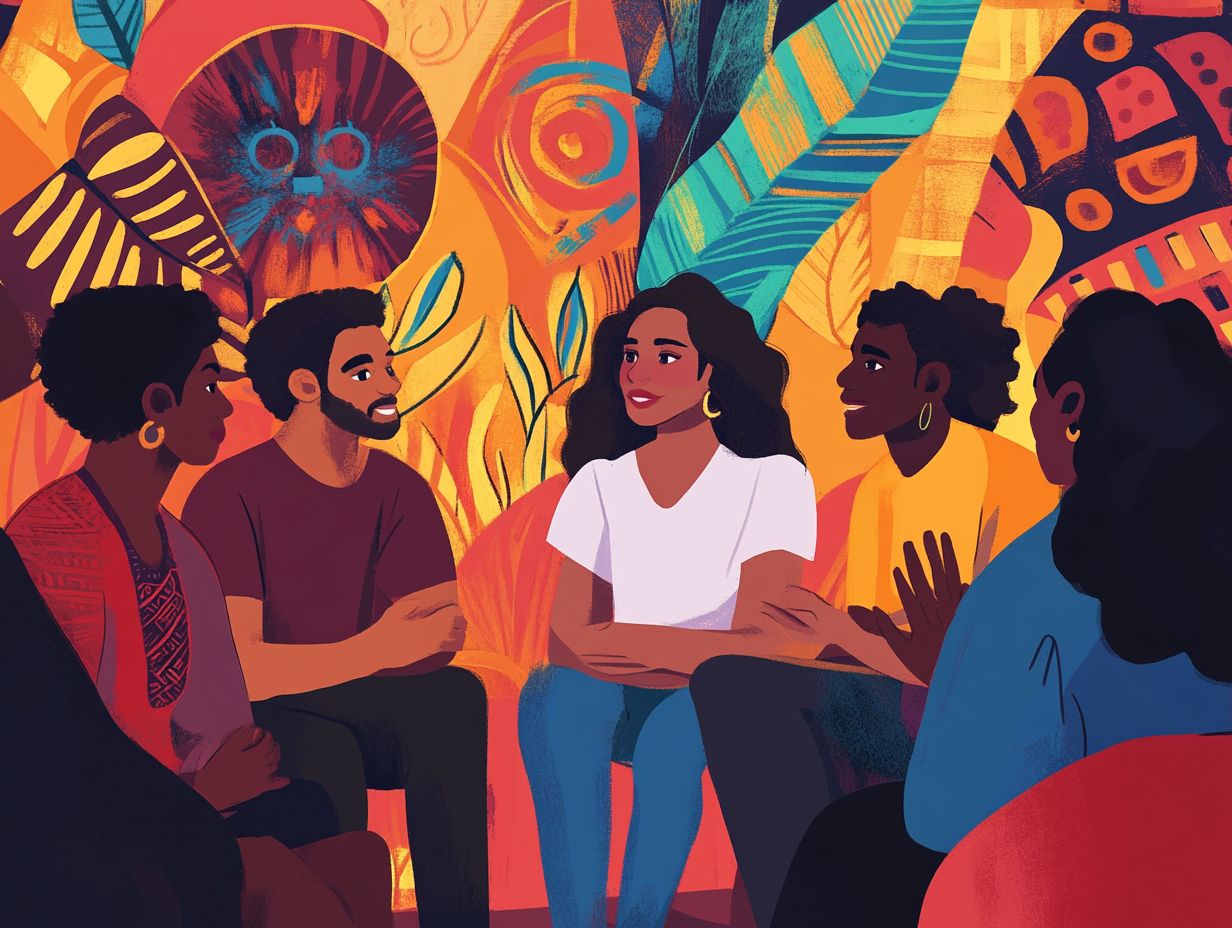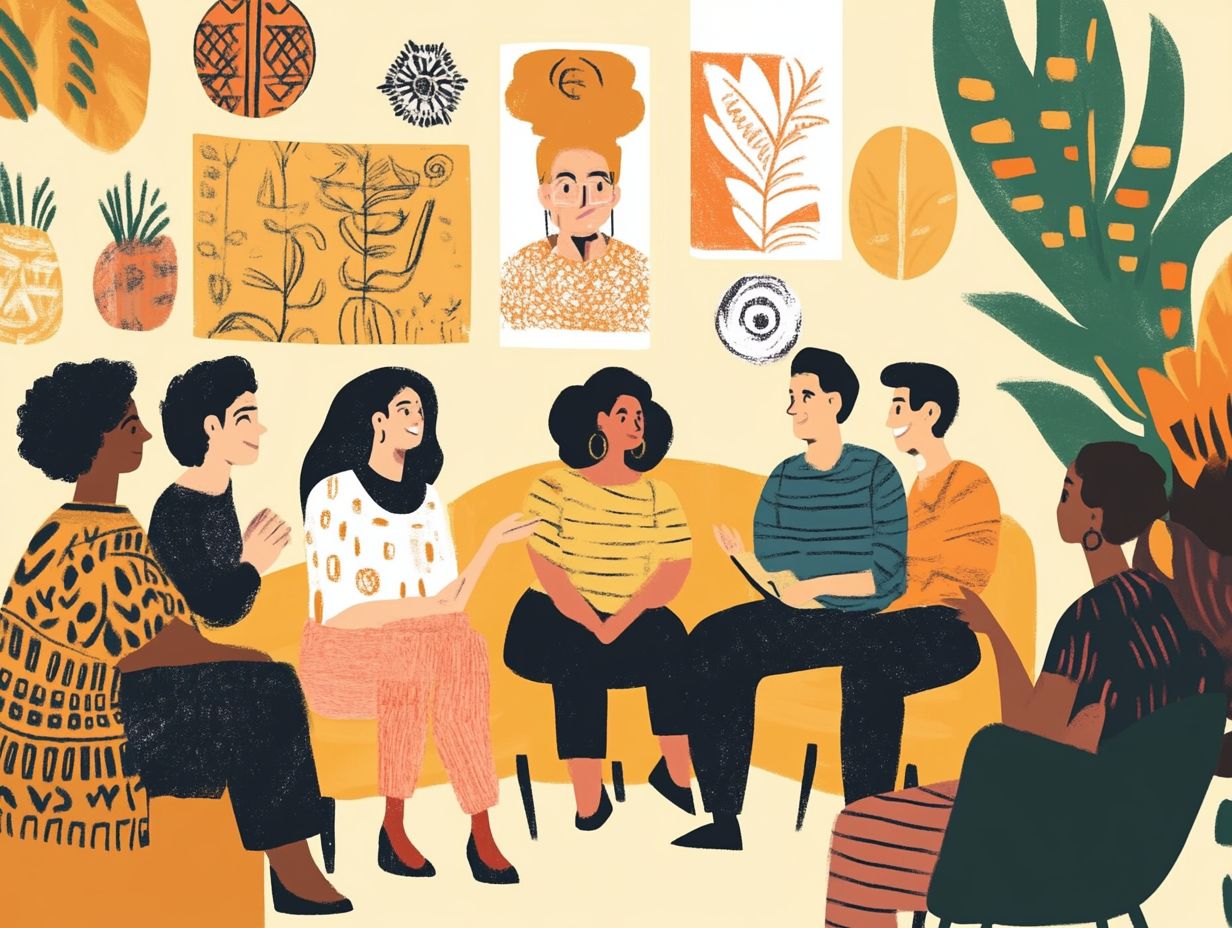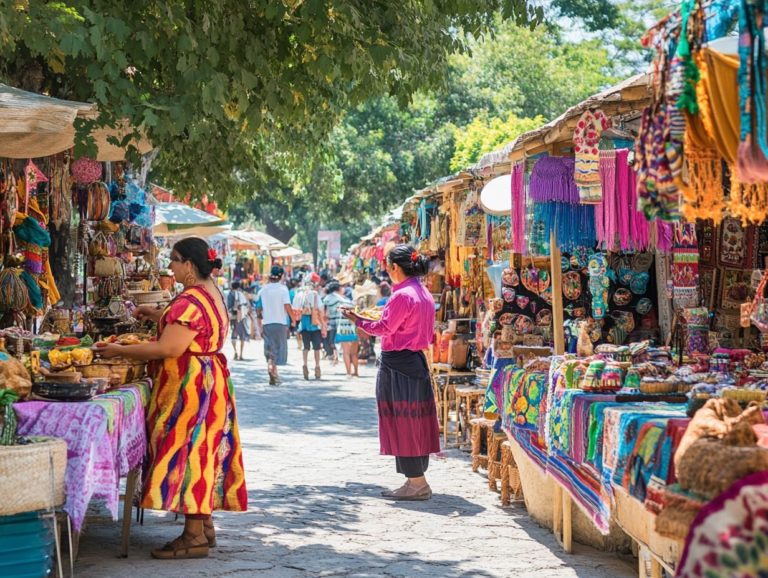5 Challenges of Cultural Adjustment and How to Overcome Them
Navigating a new culture presents a blend of excitement and apprehension, bringing unique challenges that can leave you feeling overwhelmed.
From grappling with language barriers to navigating unfamiliar social customs, the process of cultural adjustment can stir feelings of isolation and homesickness. This article explores five key challenges you might face while settling into a new environment, giving you practical tips to not just cope but truly thrive.
Uncover ways to embrace these changes and transform potential obstacles into enriching experiences that deepen your understanding and connection to your new surroundings.
Contents
- Key Takeaways:
- 1. Language Barriers
- 2. Differences in Social Norms and Customs
- 3. Feeling Isolated and Homesick
- 4. Adapting to Different Food and Diet
- 5. Dealing with Culture Shock
- What Is Cultural Adjustment and Why Is It Important?
- What Are the Stages of Cultural Adjustment?
- How Can One Prepare for Cultural Adjustment?
- What Are Some Tips for Overcoming Language Barriers?
- How Can One Learn About and Respect Different Social Norms and Customs?
- What Are Some Ways to Combat Homesickness and Feelings of Isolation?
- How Can One Adapt to a Different Diet and Food Culture?
- What Are Some Strategies for Coping with Culture Shock?
- How Can Cultural Adjustment Benefit Individuals?
- What Are Some Common Misconceptions About Cultural Adjustment?
- Frequently Asked Questions
- How can I overcome language barriers when adjusting to a new culture?
- What are some ways to deal with homesickness while adjusting to a new culture?
- What should I do if I experience discrimination while adjusting to a new culture?
- How can I adapt to unfamiliar social norms in a new culture?
- What are some tips for adjusting to a new lifestyle in a different culture?
Key Takeaways:

- Learn basic phrases, use translation tools, and practice with native speakers to overcome language barriers.
- Research, observe, and embrace open-mindedness to understand social norms and customs.
- Connect with others, stay in touch with loved ones, and find familiar activities to bring home to your new place.
1. Language Barriers
Language barriers are significant hurdles for anyone adapting to a new culture. These challenges can create communication issues, making social integration and academic success difficult. Understanding and overcoming them is crucial for effective cross-cultural communication and personal growth.
These obstacles can complicate everyday conversations and lead to feelings of isolation and frustration, impacting your ability to build meaningful connections. To navigate these challenges, consider strategies designed to enhance your language skills and boost your confidence.
- Enroll in language classes for a structured learning environment that aids your progress.
- Participate in language exchange programs to practice with native speakers in a relaxed setting, making learning enjoyable.
- Use apps and websites to practice your language skills anytime, anywhere!
These efforts will help you meet more people and cultivate stronger interpersonal relationships.
2. Differences in Social Norms and Customs
Understanding the nuances of social norms and customs is essential for you. This knowledge will help you integrate into diverse communities and appreciate the rich tapestry of cultural differences.
By grasping these distinctions, you can forge meaningful relationships and sidestep misunderstandings. For example, maintaining eye contact signifies confidence in some cultures, while in others, it may appear confrontational. The concept of personal space also varies; some societies embrace close proximity during interactions, while others prefer a more reserved approach.
Embracing these behavioral differences nurtures respect and highlights the importance of open-mindedness. This mindset will help you adapt and thrive in unfamiliar settings while enriching your own perspectives.
3. Feeling Isolated and Homesick
Feeling isolated and homesick is common for anyone studying abroad. It can manifest through symptoms that hinder emotional adjustment and overall well-being.
This longing for familiar surroundings can create loneliness, making it hard to fully embrace your new journey. Establishing a personal support system while away from home is crucial; having companions who understand your struggles can ease feelings of despair.
Dive into community activities! Join local clubs and connect with new friends. Simple gestures like reaching out to friends back home or seeking fellow students can greatly reduce that sense of isolation.
Remember, keeping communication lines open and immersing yourself in the local culture are essential steps to navigate these emotional waters.
Start your journey today by reaching out to someone new!
4. Adapting to Different Food and Diet
Adapting to new foods is vital for your cultural adjustment as an international student. Food culture varies widely and is deeply connected to local customs.
The emotional experience of embracing these changes can be complex. Imagine the thrill of discovering new culinary adventures while battling nostalgia for familiar tastes. It s perfectly normal to wrestle with dietary preferences that may starkly contrast with local offerings.
To navigate this transition with ease, explore local farmers markets. Don t miss out on this wonderful opportunity to connect with native ingredients while still honoring your culinary roots.
You can also incorporate familiar herbs or spices into traditional dishes. This creates a delightful bridge, allowing you to savor the flavors of your new home without compromising your personal tastes.
5. Dealing with Culture Shock

Dealing with culture shock is a complex experience that many international students encounter, marked by distinct stages of adaptation and often accompanied by challenges in stress management.
Imagine the thrill of arriving in a new country, only to find yourself grappling with frustration and sadness as the realities of cultural differences begin to sink in. This emotional rollercoaster can take a toll on your mental well-being, making it essential to establish coping strategies from the outset.
To navigate this period with greater ease, engage in mindfulness practices, seek social support through local communities, and gradually immerse yourself in the new culture. Enhancing your cultural awareness involves learning about local customs and actively seeking interactions with residents, fostering a sense of belonging and helping alleviate feelings of isolation.
What Is Cultural Adjustment and Why Is It Important?
Cultural adjustment is the intricate process through which you acclimatize to a new culture, a journey particularly vital for international students. This experience fosters personal growth and enhances your cultural understanding and overall well-being in a global context.
Successfully navigating this multifaceted journey shapes your identity and aligns your academic expectations with the realities of your new environment. Grasping local customs, languages, and social norms is essential.
These skills enable you to forge deeper connections with peers and faculty, leading to greater participation in classroom discussions, fruitful academic collaborations, and a heightened sense of belonging within the university community.
Ultimately, a smooth transition into the local culture enriches your educational experience, making you more adaptable and well-prepared for future challenges.
What Are the Stages of Cultural Adjustment?
The stages of cultural adjustment typically include pre-departure, honeymoon, frustration, adjustment, and acceptance. Each of these phases plays a crucial role in your emotional journey, often referred to as the emotional roller coaster, as you navigate culture shock and embark on personal growth.
During the pre-departure stage, you might feel a whirlwind of emotions ranging from excitement to anxiety while preparing for a new life abroad. This stage is often fueled by anticipation and the hope for enriching experiences ahead.
Upon arriving in your new country, the honeymoon phase sets in. You may find yourself enveloped in euphoric feelings and curiosity about the diverse cultures, tantalizing food, and breathtaking landscapes surrounding you.
However, as reality starts to take hold, frustration could creep in. You may encounter language barriers, social isolation, or cultural misunderstandings that can be quite challenging. In these moments, it’s essential to employ coping strategies. Consider following 5 tips for navigating cultural differences and seek support from peer networks or dive into local activities to help navigate these hurdles.
Eventually, as you find your footing and establish new routines, you will transition into the adjustment and acceptance stages. Here, you ll cultivate a deeper understanding and appreciation for your host culture, enriching your overall experience abroad.
How Can One Prepare for Cultural Adjustment?
Effective preparation for cultural adjustment requires you to focus on mental readiness and cultivate cultural awareness, which is understanding the differences in cultures. This approach will help you, as an international student, navigate the complexities of living abroad while enhancing your ability to adapt.
Start by looking into local customs, traditions, and social norms. This research can significantly reduce feelings of isolation. Connecting with community support networks such as cultural clubs or online forums offers you a sense of belonging and a valuable platform for sharing experiences.
Emphasizing open-mindedness and adaptability is essential. These qualities enable you to embrace new experiences and perspectives, making your transition much smoother. Actively engaging in local events and stepping outside your comfort zone can broaden your horizons and create meaningful connections within your new community.
What Are Some Tips for Overcoming Language Barriers?
Overcoming language barriers is crucial for effective communication and fostering interpersonal relationships. It requires you to take active steps to navigate communication in a foreign environment.
To truly excel in this journey, consider exploring language exchange partnerships. These allow you to connect with native speakers who are eager to learn your language in return.
Utilizing online resources, such as language learning apps and websites, can offer you structured lessons and practical exercises tailored to your skill level.
Attending local language classes not only provides formal instruction but also opens the door to invaluable immersive practice and social interaction. This approach enhances your confidence while cultivating meaningful connections within your community.
How Can One Learn About and Respect Different Social Norms and Customs?

Understanding and respecting different social norms and customs is essential for building cultural awareness and effectively navigating the community challenges faced by international students.
When you observe local customs and engage with community members, you gain insights into traditions and show a genuine interest in the culture. This kind of engagement is transformative; it fosters respect and nurtures meaningful connections.
Participating in local festivals, attending community workshops, or simply striking up conversations with residents can provide invaluable insights into the cultural differences that shape everyday interactions. Embracing these experiences enables you to break down barriers and cultivate a deeper appreciation for the rich tapestry of human experience.
What Are Some Ways to Combat Homesickness and Feelings of Isolation?
Combating homesickness and feelings of isolation requires understanding its symptoms and a proactive approach to emotional adjustment, leveraging both personal and community support.
If you are facing these challenges, joining local groups or clubs can be a transformative experience. This offers a sense of belonging that eases the transition into a new environment.
Engaging in recreational activities like sports, arts, or outdoor adventures can pave the way for new friendships. These experiences help shift your focus away from loneliness.
Maintaining connections with loved ones back home through regular video chats or messages is essential for enhancing your emotional well-being. Community support is invaluable; by engaging with neighbors or visiting local community centers, you can share experiences, seek advice, and build a supportive network that effectively alleviates feelings of isolation.
How Can One Adapt to a Different Diet and Food Culture?
Adapting to a different diet and food culture calls for a willingness to adjust your behaviors and embrace new customs. This approach will ultimately enrich your experience of living abroad.
Exploring local food culture can be a delightful journey that goes beyond mere sustenance. Participating in cooking classes offers hands-on experiences that help you uncover intricate techniques behind traditional dishes while connecting with locals who share their culinary heritage.
Food festivals showcase regional fare, inviting you to savor flavors that tell the stories of the land and its people. An open-minded approach fosters your integration into the community and encourages you to try unusual ingredients or unfamiliar dishes. This transforms meals into opportunities for connection, understanding, and appreciation of our world’s diversity.
What Are Some Strategies for Coping with Culture Shock?
To tackle culture shock, you can use practical strategies that manage stress and boost your understanding of different cultures key components for personal growth during this adaptation journey.
Establishing routines can provide a sense of stability in what might feel like an overwhelming environment. By weaving familiar practices into your daily life, you may discover comfort and reassurance amidst the change.
Connecting with fellow students who share similar experiences helps cultivate a supportive community, making your transition smoother. Engaging in discussions or collaborative activities can significantly alleviate feelings of isolation.
If adjustment proves particularly challenging, consider seeking professional support. Counselors can offer valuable insights and coping techniques tailored to your situation, ultimately facilitating emotional adjustment and nurturing resilience.
How Can Cultural Adjustment Benefit Individuals?
Get ready! Cultural adjustment opens doors to amazing benefits, including a deeper understanding of diverse cultures, personal growth, and the chance to forge rich social networks that enhance your global perspective.
These advantages go beyond just the here and now; they are essential for preparing you for leadership roles in our increasingly interconnected world. As you embrace different cultures, you’ll develop crucial skills for talking with people from different cultures that allow you to engage meaningfully and respectfully. This boosts your confidence and fosters adaptability.
When challenges arise in professional settings, the insights gained through cultural adjustment help you navigate complex scenarios, making you a more effective leader. Ultimately, embarking on this journey is a crucial step toward becoming a responsible global citizen.
What Are Some Common Misconceptions About Cultural Adjustment?

Common misconceptions about cultural adjustment often arise from ethnocentrism (the belief that one s own culture is superior), which can cloud your understanding of the adaptation process and hinder effective perspectives for international students.
In reality, cultural adjustment is anything but a straight path; it’s a dynamic journey filled with highs and lows. You’ll oscillate between excitement and challenges, navigating complex emotions and adapting to new environments at your own pace. For practical advice, check out these top 10 tips for adapting to a new culture.
While some see cultural differences as obstacles, it’s crucial to reframe them as golden opportunities for growth and learning. Embracing adaptability enriches your experience and fosters open-mindedness, allowing you to forge meaningful connections and gain diverse perspectives.
By recognizing the intricate nature of adjustment, you can better support others, dismantling stereotypes and promoting a deeper understanding of global cultures.
Frequently Asked Questions
What are the 5 challenges of cultural adjustment?
The 5 challenges of cultural adjustment are language barriers, homesickness, discrimination, unfamiliar social norms, and adjusting to a new lifestyle.
How can I overcome language barriers when adjusting to a new culture?
Overcoming language barriers is possible! Take classes, practice with locals, and dive into local activities and traditions.
A pocket dictionary or translation apps can be very handy.
What are some ways to deal with homesickness while adjusting to a new culture?
Stay connected with loved ones back home using technology. Incorporate elements of your home culture into your new environment.
Explore and discover your new surroundings to help ease feelings of homesickness!
What should I do if I experience discrimination while adjusting to a new culture?
Reach out for support from trusted friends or organizations if you face discrimination. Know your rights and local laws as a visitor or resident.
Observe locals and ask questions to learn about their customs. Be open-minded and willing to try new things while showing respect for cultural differences.
What are some tips for adjusting to a new lifestyle in a different culture?
Find a balance between embracing new experiences and maintaining your personal values. Stay flexible, practice self-care, and seek support when needed!





